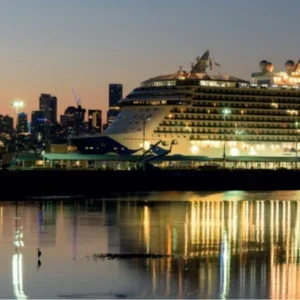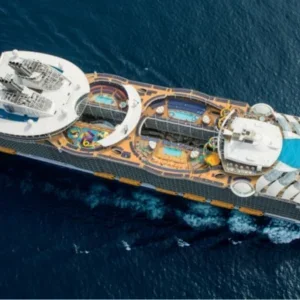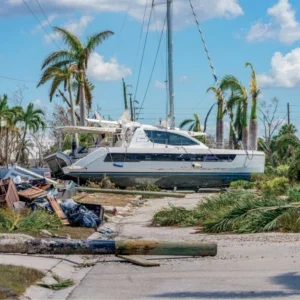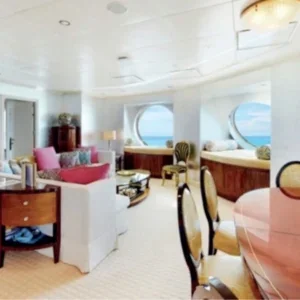Fresh, locally sourced ingredients are the stars of Crystal River Cruises’ culinary programme, which was designed by industry veteran Toni Neumeister to give guests a taste of the history and culture of the regions along the Rhine, Danube and Main rivers. Experience has taught Crystal’s senior vice-president of hotel operations that consistency is key to any successful food and beverage concept, and each aspect of this one – from the carefully chosen southern German beers to the impeccable service – delivers every time.
When Crystal River Cruises’ first vessel set sail on its maiden voyage in mid-2016, the entire industry was watching. Not only is Crystal Mozart the largest river ship in Europe, it’s by far the most luxurious, with its indoor pool and jacuzzi, spacious gym and ultra-wide sundeck complete with retractable bar. There are two custom-built Italian yachts for private excursions and no fewer than four restaurants, all serving fresh, seasonal cuisine inspired by, and sourced from, the regions and cities that line its route along the Danube, including Vienna, Budapest and Bratislava.
The vessel’s signature restaurant is The Waterside, which serves buffet breakfast and lunch, and a more formal menu in the evening. Crystal Mozart is also home to the Blue Bar & Grill, a casual lunch spot serving soups, salads, sandwiches and local specialities, and the Bistro, which offers light bites during the day and sharing platters of global tapas in the evening. The Vintage Room is an intimate upscale dining venue for 12 guests, and there is a 24-hour self-service drinks and snacks station called The Pantry.
In-suite dining is also available 24 hours a day and every cruise includes a lunch or dinner at one of seven Michelin-starred restaurants along Crystal Mozart’s route, with food, wine, transportation and gratuity all covered.
Crystal Mozart is set to be followed by the first of the company’s ‘Rhine class’ river yachts, the Crystal Bach. On this ship, guests can expect to dine on the likes of Dutch herring on dill mousse, German green split pea soup with smoked duck, and coldwater lobster served with a creamy leek risotto. As on the Crystal Mozart, the food specialities have been inspired by Michelin-starred restaurants and designed to authentically represent the destinations visited, while coffees and teas will come courtesy of prestigious Austrian company Julius Meinl. After Crystal Bach we can expect the Crystal Mahler, the Crystal Ravel and the Crystal Debussy to join Crystal’s river fleet. All four ‘Rhine class’ vessels will feature identical dining venues to the Crystal Mozart, minus the Blue Bar & Grill.
Consistent service
Neumeister has worked in the luxury travel industry for more than 30 years and has been at Crystal for over 20 years. For him, the key to the success of any food and beverage offering, whether it’s on land, at sea or on the rivers of Europe, is consistency. “You have to be able to deliver a consistent product, and in order to do that you first need to hire the right people, put them in the right seat and keep them,” he says.
For this reason, no small amount of time or investment went into the recruitment and training process for Crystal’s first foray into river cruising. As soon as the company decided to go into the river business, Neumeister was on the ground making contact with hotel and culinary schools. In-depth on-board interviews followed – “they need to know where they will end up if they get the job; a ship operation is a strange environment,” he notes – after which every staff member was enrolled in three weeks of intensive training before the ship launched.
“The service has to be on the same level as the food product. I always say we are providing outstanding service and excellent food, and that’s the way it should be,” Neumeister says. “At Crystal, we have a very clear philosophy, which we call our Crystal Basics – there’s always somebody who serves somebody who in the end serves a Crystal guest.
“That starts from the reservation department in the office to the chef who creates the fantastic cuisine to the service member who serves it and talks to the guest. They all have to be at the same level – there cannot be a difference.”
Local and seasonal
Preparation was no less thorough when it came to the food and drink itself. Just as they went from school to school in search of the right employees, Neumeister and his team put in the hours to find the right suppliers to deliver Crystal’s unique Michelin-inspired farm-to-table concept.
“I was quite surprised [at how challenging it was]. We didn’t invent river cruises; they’ve been out there for a long time, but we have started with a completely different business model – going in at the top end of the luxury market – that no one has really done before,” Neumeister says. “Because of this, suppliers weren’t used to the quality I needed to deliver our product, so first we had to find the right suppliers and secondly we had to re-educate them.”
Although this was a time-consuming process, today Neumeister is extremely happy with the products customers are enjoying on board the Crystal Mozart. “The easy part [about river cruising, compared with ocean cruising] is that you can focus totally on local, seasonal products,” he grins. “When it’s white asparagus season, you jump on it. When it’s apricot season, you focus on apricots and not on plums. We also have coffees and teas from a coffee house in Vienna, and almost 20 wines from Austria.” In many ways, food and beverage is a means of bringing guest and destination that much closer together. “We want our guests to not only experience the cultural and historical sites, and the art and music of the places they visit – we also want them to experience the cuisine,” Neumeister says. “So we bring local ingredients on board and, with them, create our own recipes and use local recipes too.”
Star cuisine
Every guest on the Crystal Mozart also has the option to dine at one of a selection of seven Michelin-starred restaurants in Vienna or Budapest, including Tian in Vienna, one of only four vegetarian restaurants to receive the coveted star, and Tanti in Budapest, known for its creative re-imaginings of classic Hungarian dishes.
But often, Neumeister laughs, they will return from their world-class dining experiences saying the food on the ship is even better. “It’s not that we don’t deserve a Michelin star, if not two, on the river for the product we deliver,” he says. “It’s rather that we have not been able to convince them that they should start rating us.”
This is despite the space constraints even on a ship as large as the Crystal Mozart. Unlike Crystal’s first river ship, the four upcoming Rhine-class ships are new builds with less square footage to play with, but there will be more space for kitchens. “Of course, you’d prefer to sell a suite than have a huge kitchen but we have come up with a very good compromise, especially on the new river ships we’re launching,” Neumeister explains. “As all of our rooms are beautiful balcony suites above the water line, we have more space in the lower levels of the ship for the kitchen and storage facilities. Working with river experts, we’ve really made the most of what we can do in a limited space.”
Winning combination
When asked to pinpoint the aspect of Crystal’s culinary programme that he’s most proud of, Neumeister is unable to choose. “It’s a combination of the outstanding service we deliver, the high standard of the cuisine – in terms of the creativity and the use of fantastic, fresh seasonal ingredients, and the drinks programme, which is also really focused on local products,” he says. “In Austria, we offer an Austrian beer; in Germany, we offer a German beer, and these are all high-quality products, not just beers you would find in every supermarket. When it comes to wine, you might not only want a riesling when you’re in Germany, you might also want to try a silvaner – and you can. All the little things are incredibly important in the luxury world of our business.” As the rest of Crystal’s river fleet is rolled out across Europe, Neumeister is excited to expand the number of Michelin-starred restaurants that guests can visit and extend the line’s local, fresh F&B concept to new regions. “We’re going to be touching Belgium, southern Germany, Alsace and Switzerland – these are fantastic food regions and they have everything – there’s so much you can do,” he says.






